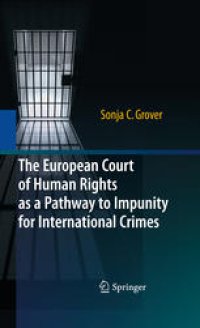
Ebook: The European Court of Human Rights as a Pathway to Impunity for International Crimes
Author: Sonja C. Grover (auth.)
- Tags: European Law/Public International Law
- Year: 2010
- Publisher: Springer-Verlag Berlin Heidelberg
- Edition: 1
- Language: English
- pdf
Introductory Remarks on the Perspective and Intent of the Author in Writing This Monograph The European Court of Human Rights comments in the judgment Korbely v. Hungary that: However, clearly drafted a legal provision may be, in any system of law, including criminal law, there is an inevitable element of judicial interpretation. There will always be a need for elucidation of doubtful points and for adaptation to changing circumstances. Indeed, in the Convention States, the progressive development of the criminal law through judicial law making is a well-entrenched and necessary part of legal tradition…The Court’s role is con?ned to ascertaining whether the effects of such an interpretation [interpretation by the national courts and authorities of domestic law which sometimes may refer to or incor- rate international law principles or agreements] are compatible with the Convention 1 [European Convention on Human Rights and Fundamental Freedoms] (emphasis added). This book then examines to what degree this “inevitable element of judicial interpretation” has been applied by the European Court of Human Rights in a manner consistent with the guarantees of the most fundamental human rights under international criminal, human rights and humanitarian law.
This book presents contentious case rulings by the European Court of Human Rights providing extensive case notes and questions. The book elucidates just how the Court came in those cases to contribute to lack of State accountability and to impunity for individual perpetrators of international crimes. Issues addressed include the Court’s: derogation of the jus cogens nature of certain fundamental human rights, grant of State immunity from any liability for systemic torture, unjustified failure to classify certain European Convention on Human Rights violations as international crimes; and improper declining of jurisdiction where States participated in a U.N. peace-building mission that itself involved serious violations of the U.N. Charter human rights principles. The book argues that the moral integrity of the Court’s rulings (rulings that promote and protect international human rights) is an essential aspect of promoting the internationalization of the rule of law.